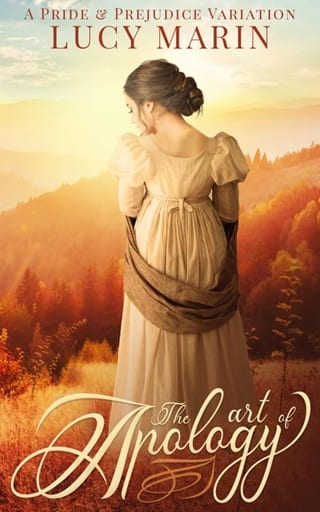Chapter 3
CHAPTER THREE
E lizabeth was chatting about the assembly with her mother, sisters, and Charlotte Lucas when her father returned. He had not told them where he was going, but that was not unusual. What was uncommon was the thunderous set of his features as he strode past the drawing room door to the stairs, his footsteps heavy as he ascended. Alarmed and curious, she excused herself and followed him to his book-room.
“What is it?” he said when he noticed her. He stood by a small table, pouring a glass of wine from a decanter.
“I was going to ask you that. Is anything amiss?”
She watched with a mixture of wariness, anxiety, and a touch of amusement as he grumbled—his words too low to make out—paced in front of the window briefly, and finally took a seat behind the broad expanse of the antique walnut desk. He nodded to indicate the chair across from him, and she dutifully lowered herself into it.
“I was at Netherfield Park,” he announced .
“Netherfield? Why?” Had he gone to see Mr Bingley? After all, that gentleman had danced two sets with Jane, and her father might wish to discourage such a mark of favouritism. Though that would be even more surprising than knowing where he has been this morning. Elizabeth loved her father dearly, but he was not the most diligent of men. He was intelligent and, when he chose to be, affable, but he was also lazy and claimed that fathers had few responsibilities to daughters apart from giving permission to any man foolish enough to want to marry them.
“To see Mr Darcy.” Mr Bennet took a large mouthful of wine.
“Mr Darcy? What business do you have with him ?” No sooner was the question past her lips than she understood. “Oh, Papa—” How she wished he had stayed at home, as was his custom! His interference would surely only make the situation worse.
As she spoke, he said, “To demand he explain why he dared to insult you, of course.”
Before he could go on, she interjected. “I told you last night it was best forgotten. Who cares what he thinks of me?”
“I do!” Quickly draining the wine remaining in his glass, her father stood and went to look out of the window. They were silent for a long moment until he turned to face her. “His behaviour was ungentlemanly, and someone had to tell him. As your father, I am the only logical person for the job. It is enough that you had to hear such disparaging remarks. To know that others did too—that they dared to speak to you of it?—”
“Papa— ”
“No, Lizzy.” He gave her a stern look. “It had to be done, and so I did it. Believe me, I took little pleasure from it. To think I believed Mr Bingley seemed respectable when I called on him earlier this month. Young and a little stupid, perhaps, but harmless.”
Elizabeth’s brow furrowed. “Mr Bingley said nothing unkind of me. Did you see him this morning too?”
“I did not, but what manner of man must he be to have such a person for a friend? We cannot help who our relations are—and Lord knows, we seldom manage to influence how silly they behave. I am less inclined to judge a man by his family than by those he chooses to associate with.”
She stood and, keeping her voice calm and persuasive, said, “Mr Bingley struck me as a charming, delightful, and not at all stupid gentleman. I liked him. Dislike Mr Darcy as much as you will. I assure you, there is nothing he can do to make me forget or alter my first—decidedly poor—opinion of him. But give Mr Bingley a chance to prove himself. Do not judge him by his friend.” Elizabeth’s plea was both what she felt was right and because she had seen how flattered Jane had been by his attention. Her elder sister tended to think too well of people, but there was something about Mr Bingley that inspired Elizabeth to trust him. She spoke of how friendly he had been and how he had impressed everyone with his good manners.
Soon, Mr Bennet’s countenance eased. He returned to his chair and, after chuckling, said, “You should have seen Mr Darcy’s expression! He was clearly shocked by my reprimand. I shall be interested to see whether he apologises to you. He said something about his regrets to me, but I told him you were the one he needed to address.”
“I do not care whether he does.”
Her father waggled a finger at her. “But you should, my dear, you should. If he does, we might laugh at how difficult it was for him—because I assure you, it will take a Herculean effort for such a man to lower himself to apologise to a young lady he sees as beneath his notice. If he does not, then we might laugh at all the ways he avoids doing what is right. I have known many men like him. He will find some way to excuse himself, to blame you or me or who-knows-what to give himself permission to avoid humbling himself.”
Elizabeth giggled. “I still hope he goes away soon. However, I very much anticipate Mr Darcy providing me with endless reasons to laugh at him while he is in the neighbourhood!”
Bingley reported with an odd amount of enthusiasm that they would attend the same church as the Bennets did. He made the announcement after dinner on Saturday.
“Everything Miss Bennet said of it tells me it is exactly the sort of church I prefer,” Bingley said.
“You prefer a church?” Miss Bingley sniggered, as did her sister. “I seem to recall how difficult it is to get you out of bed on time to attend services whenever we are in Scarborough and our relations insist we go.”
“You are speaking nonsense,” Bingley retorted. “I happen to like going to church, especially when it is a charming country parish, such as this. It is different in London or even a larger town when one has been up half the night at some ball or party. Miss Bennet says that the parson is excellent. What was his name? Jones or Cole or something like that. It does not matter. We shall meet him soon enough. He is middle-aged, I believe, and has been here for…”
Darcy ceased listening as Bingley continued to sing the praises of a gentleman and church he had never encountered. It did not much matter to Darcy where he attended services while in Hertfordshire. He imagined Bingley’s true pleasure was the prospect of seeing Miss Bennet again; he had often mentioned her since the assembly. Darcy conceded that she was very pretty, and Bingley said she was also guileless and interesting to talk to. If Bingley wanted to know her better, Darcy had no objection—presently he did not, at least. Bingley was young and enjoyed the company of young ladies.
Not that I consider myself old, he reflected. He was only four years Bingley’s senior, but at times, he felt much older. He had always thought that had more to do with his circumstances—the early deaths of both his mother and father, a large estate to manage, and the care of his sister. To add to that, his family placed many expectations on his shoulders, notably about choosing a proper bride.
“You need look no further than your cousin Anne,” his uncle, the Earl of Romsley, had said to him the previous winter. “My sisters both hoped you would marry. You would gain Rosings and an excellent property to leave your second son, and she does have excellent connexions.” He had laughed, no doubt thinking he had made a joke, given he was the most impressive connexion of the family.
The countess had repeated the suggestion not two months ago. “You ought to take a wife. It would do you good to have more company when you are at Pemberley, and now that Georgiana is no longer at school, she will spend more time in Derbyshire too. She needs a lady with her.”
His aunt, Lady Catherine de Bourgh, was more insistent, often speaking as though the matter was already settled. As for Darcy’s paternal relations, they believed he should follow in his father’s footsteps and marry a lady of high rank and great fortune. For his part, he was in no rush to settle down, and he had told his family so repeatedly. In another few years, he would select a suitable lady, and they would have a perfectly ordinary marriage.
It occurred to him that Bingley had also been orphaned at an early age and was responsible for one of his sisters; Mrs Hurst had already married by the time their father had died. The difference must be in their circumstances. Miss Bingley was five or so years older than Georgiana, and Bingley did not suffer under the same weight of family and societal expectations as he did. For all their wealth, Darcy did not know that anyone pursued Miss Bingley for her dowry as Wickham had his sister, and several of Darcy’s acquaintances had spoken to him of Georgiana’s impending entry into society. They had done so casually, to be sure, but he had understood that they were already contemplating the size of her fortune and excellent breeding and how an allegiance with her would benefit them. Was it any wonder he despised and distrusted people unknown to him and whose situation in life was so decidedly beneath his own? The danger he faced in apologising to Elizabeth Bennet was that she and her family would immediately seek to form a connexion with him.
Indeed, I would not be surprised if Mr Bennet’s visit was part of a scheme. First, convince Darcy he must apologise, then trade on his guilt for having insulted the girl—not that he had any, but they would assume he did—and before he knew it, they would have tricked him into proposing to her. That would never happen!
The next morning, the Netherfield party took the pew across the aisle from the Bennets. They had arrived at the church with only time to nod a greeting to them and others before the service began because the ladies had been slow to prepare. Darcy usually thought Mrs Hurst and Miss Bingley dressed fashionably and elegantly, and he did today as well, but here, in this modest country parish, on a Sunday morning of no special import, they had taken it too far. Knowing it was mean-spirited of him, he wondered whether they intended to advertise their sense of superiority, to ensure everyone looked at them instead of attending to the parson. With effort, he banished the thought. They were his friends; mostly he considered them his friend’s sisters, but still, they were more than mere acquaintances.
I shall not look, he silently vowed. In the minutes he had been in the church, he had repeated the statement several times. What, or rather whom, he would not look at were the Bennets. He sensed their eyes on him, but he was determined to be wise and not give them a single thought. It was not so easy, however, and Darcy’s explanation for why he was so conscious of the family’s presence was Mr Bennet’s reprimand, which still left him feeling both indignant at the affront and wishing he had remained silent at the assembly.
When he was no longer able to resist, he glanced towards the Bennets, taking care not to make it obvious lest he be seen. His mouth went dry, and when he swallowed, his throat hurt due to the lack of moisture. All he had managed to see was her. Miss Elizabeth sat at the end of the pew, her gaze steady on the parson and her chin tilted upwards. Her spencer and bonnet were both a rich blue, which only enhanced the colour of her hair and skin.
That did not explain why his heart raced. It is only because I suppose I ought to apologise to her, regardless of why they want me to. He would be careful of the consequences—ensure Miss Elizabeth Bennet knew there would be no friendship between them. It was simply a task, an unpleasant chore, and one he would do to satisfy Mr Bennet and prevent him from complaining to his friends. This entire stupid affair only served to remind Darcy why he disliked these confined societies where nothing of note ever happened and everyone was far too familiar and comfortable with each other. A tempest in a teacup indeed.
When the service ended and they stood to depart, Bingley slapped Darcy on the shoulder and said, “That was excellent, was it not? Truly one of the best sermons I recall hearing in a very long while.”
“Yes. Certainly,” Darcy muttered, trusting his friend would not notice how distracted he was. He was attempting to determine what he would say to Miss Elizabeth. The business of apologising would take no more than a minute, and then he could return to Netherfield—as long as Bingley did not insist on spending the entire morning chatting to people.
Darcy took his time leaving the pew and walking down the aisle. He spotted Miss Elizabeth immediately as he left the church, pausing a moment near the door to watch her as she stood, talking to one of her sisters whose name he did not know. He walked towards her with his characteristic long stride, his approach commanding enough to send the other Miss Bennet scurrying off. Miss Elizabeth turned towards him and made a shallow curtsey, but she did not speak.
“Miss Elizabeth. I hope you are well,” he said, giving her a nod that was curter than he had intended.
“I am, thank you.”
Her cold demeanour almost made him turn and walk away. Maybe he had been mistaken about her, and rather than having been waiting for an apology, she had as much interest in hearing one as he had in giving it. The thought gave him a momentary pleasure because it meant he could simply say some other innocuous statement, about the weather perhaps, and leave her be. But his hope was soon extinguished when he considered the more likely explanation for her manner. She was one of those ladies who would act offended or distressed until a gentleman said whatever he thought might please her, after which, they would be all smiles and giggles and fluttering eyelashes. Good Lord, he despised girls like that! One, two minutes and the task will be done. I shall never have to speak to her again!
“I regret that you overheard the manner in which I referred to you the other evening. At the assembly. When I was speaking to Bingley. Please accept my apology.” He had added the part about his friend to remind her it had been a private conversation. Albeit one had in a crowded public place.
She regarded him for a moment, still acting aloof, before saying, “Thank you.”
He felt his brow furrow and forced his features to ease; he might be puzzled by her response, but he did not want her to know it. “Is that all the reply I am to expect?”
She averted her gaze long enough to adjust her bonnet, then met his eyes again. “An apology given under duress is not an apology, Mr Darcy. A true apology must be felt here.” She tapped her chest above her heart. “You do not regret what you said. The lack of sincerity in your tone told me as much. I do not believe you even regret that I heard you. The only reason you have spoken to me today is because my father dared to tell you that you behaved inappropriately. Am I mistaken?”
Heat rose up the back of his neck. She was correct. He did not regret that she had heard him; he had meant for her to hear him, to discourage any pretensions before they were begun. When he did not immediately answer, she continued.
“You do understand that your behaviour deserves censure, do you not? I must believe you are not so lost to good manners that you are unaware how wrong it is to share your ill opinion of any lady with so many other people about. Particularly one to whom you have not even been introduced and who has done you no harm! Do you have any notion how hurtful it can be to hear yourself spoken of in that way and to know others knew of it?”
What would he have said if she gave him the opportunity to speak? He did not feel capable of uttering a single word because the only ones that came to mind would be spoken in anger in light of her reprimand and embarrassment that she understood him so well. The latter feeling would only increase the former. But if he were capable of being reasonable, he might ask whether she would mind less if they had been introduced—why that made a difference, he did not know, but both she and her father had mentioned it—or he might tell her that he did know what it was like to have people speculating about you in your presence. How often had he felt as though a thick black mass had formed in his stomach when he heard people gossiping about his wealth or sharing some nonsensical and false story about his supposed liaisons and habits.
“I do not care what your opinion of me is,” Miss Elizabeth said, and the disinterest in her tone convinced him she spoke the truth. “I do care that I have had to endure far too many people commenting on what you said of me. You must realise that everyone is speaking of it. Well, everyone is a slight exaggeration.” She chuckled, but her show of good humour was not for him. “But ladies and gentlemen I like, and even some I do not, have all wanted to discuss it with me, some to offer consolation, some to laugh at me, a few even to laugh with me. I do not blame you for your low opinion of me.”
“But I do not—” Darcy interjected. The tips of his ears burnt, and he hoped they were hidden by his hat.
“Oh, but Mr Darcy, you must think poorly of me. After all, I am only tolerable to look at, and what value is there in a lady if she is not pretty? And let us not forget that I was slighted by other men and not good enough even to be introduced to you.”
Aghast at having his words so saucily thrown back at him—and hating how they sounded coming from her—Darcy opened his mouth to assure her she was wrong. Then he saw a sparkle in her eyes that stopped him. The heat in his ears had spread over his entire face as she spoke, but currently, he felt as if a bucket of icy water had been poured over him. She was laughing at him, teasing him. Not only was it in her eyes, but the corners of her mouth were twitching as though she was struggling not to smile. He ought to be insulted, and he was, but part of him was also…intrigued, he supposed, or ever so slightly amused.
“What would you have me say?” he asked.
“Nothing you do not truly feel or believe,” she said. “At present, you do not regret what you said. Perhaps you never will. That is your right. I shall never ask you to apologise for your feelings.”
“Would you believe me if I said I knew I was mistaken?”
She shrugged. “If you only wish to express regret for speaking of me aloud where others overheard you, then I shall accept it.”
“That is all I am to expect of you?”
“At present, it is all I can offer you. You said such…disagreeable things of me without us ever exchanging a word. My looks you could see, and I cannot fault you for finding them wanting, but believing I was overlooked by other men implies my character is somehow lacking and my company to be avoided, even for the length of a set.”
He attempted to interrupt her and assure her that he did not think she was unattractive; truly, she was rather pretty. Had he failed to notice it at the assembly? She continued at once, however.
“I promise that if the day ever comes when you can genuinely say you regret speaking of me as you did, I shall humbly accept your apology. Good morning, Mr Darcy.” She gave him a cool, polite smile and went to join her father.
 Fullepub
Fullepub 



